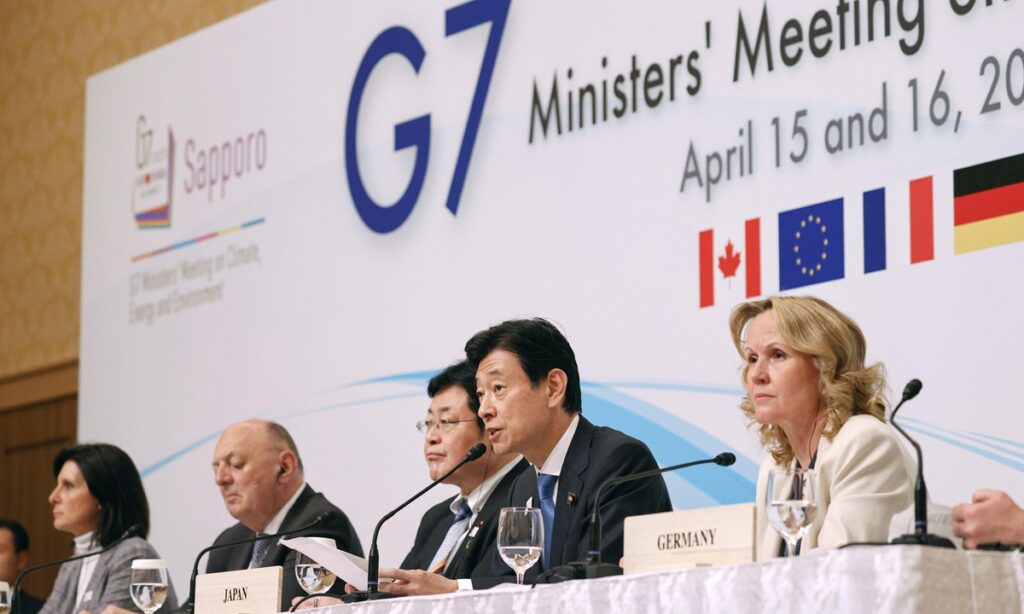Tokyo’s dashed hope suggests idea ‘cannot even win the hearts of allies’
Japan’s hope of securing unanimous support from the Group of Seven (G7) for its planned dumping of nuclear-contaminated wastewater into the sea was squashed after Germany voiced opposition.
Experts said the split views within the G7 showed that Japan’s reckless decision cannot even win the endorsement of its closest allies, not to mention among the international community.
At a press conference after the two-day G7 Ministers’ Meeting on Climate, Energy and Environment, Japanese Economy, Trade and Industry Minister Yasutoshi Nishimura said that “the steady decommissioning progress including the release of treated water into the ocean will be welcomed,” Japanese newspaper Asahi Shimbun reported on Sunday.
However, his remarks have been met with opposition from the German side.
Germany’s Minister for the Environment, Nature Conservation, Nuclear Safety and Consumer Protection Steffi Lemke said that she respects the efforts made by Tokyo Electric Power Co, operator of the Fukushima Daiichi nuclear power plant, and the Japanese government after the nuclear accident, but she “cannot welcome the release of the treated water,” the newspaper reported.
Experts noted that Japan and Germany, which both belong to the G7 and developed countries club, normally would support each other on international occasions. However, the reason why Germany has voiced opposition this time is that, as an expert in this area, Germany knows that Japan’s claim that the nuclear-contaminated wastewater has met the disposal standard after treatment is a big cover-up that has left out a significant part of the truth.
“There are over 60 nuclear radioactive substances released from the tainted wastewater that cannot be completely removed. Only part of them can be filtered by devices, while the others were diluted by adding water,” Zhou Yongsheng, deputy director of the Japanese Studies Center at the China Foreign Affairs University, explained to the Global Times on Monday.
After the press conference, Nishimura admitted to the media that he was “slightly wrong” in saying that Japan’s discharge plan was welcomed by everyone.
Chinese Foreign Ministry spokesperson Wang Wenbin commented on the German minister’s remarks on Monday, saying that Japan has ignored legitimate safety concerns raised by the international community and attempted to downplay the hazards of dumping nuclear-contaminated water into the sea for political purposes, and tried to rope in other countries’ endorsement of the plan.
“Such a deliberate attempt to whitewash wrong decisions is doomed to be futile,” Wang noted.
The Japanese government in January announced that its controversial plan to dump radioactive wastewater from the crippled Fukushima Daiichi nuclear power plant into the Pacific Ocean will start to be carried out “in the spring or summer.”
The international community has expressed strong concern over and opposition to the plan. At home, it is also faced with a great number of protests by the public.
According to a recent global poll by China Global Television Network, which drew the participation of over 30,000 netizens from various countries within 24 hours, as many as 93 percent of the respondents strongly opposed Japan’s dumping plan, and 90 percent said they found it hard to believe Japan’s claim that the treated nuclear-contaminated wastewater was safe and harmless.
Some 86 percent of the respondents criticized Japan’s disposal of the radioactive wastewater as unscientific and nontransparent.
Greenpeace, an independent environmental campaigning organization, said in an article published on Sunday that the nations of the G7 are choosing politics over science and the protection of the marine environment by supporting the Japanese government’s dumping plan.
The Chinese Foreign Ministry spokesperson also cited the Greenpeace article at the Monday press briefing.
“The Japanese government is desperate for international endorsement for its Pacific Ocean radioactive water dumping plans. It has failed to protect its own citizens as well as nations across the wider Asia-Pacific region,” said Shaun Burnie, senior nuclear specialist at Greenpeace East Asia. “Its plans are a violation of the UN Convention Law of the Sea.”
The G7 Ministers’ Meeting on Climate, Energy and Environment serves as a prelude to the G7 summit in Hiroshima, Japan scheduled in May, where observers believe that Japan, as this year’s chair, will seek to include a “welcome” from G7 members on its controversial dumping plan.
Based on the reactions from the German environmental minister, the May summit could again fall short of Japan’s expectations, Zhou noted, as it is unlikely that a consensus could be reached to support, not to mention welcome, such a plan.
However, experts said that opposition by the G7 is unlikely due to political considerations – such as pressure from the US for an ever-closer US-Japan alliance.
Reacting to the G7 joint statement on Sunday, South Korea said it does not represent the final assessment of the safety of the program by IAEA, while reiterating its position that Japan’s nuclear-contaminated wastewater discharge plan must ensure safety on a scientific and objective level and meet international standards. Transparency must also be ensured in all processes of the discharge, said a press release from the South Korean government.
(Global Times)




